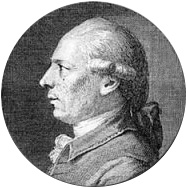François-André Danican Philidor

Portrait from L’analyze des échecs. London, second edition, 1777.
|
|
| Full name | François-André Danican Philidor |
|---|---|
| Country | France |
| Born | September 7, 1726 Dreux, France |
| Died | August 31, 1795 London, England |
François-André Danican Philidor (September 7, 1726 – August 31, 1795), often referred to as André Danican Philidor during his lifetime, was a French composer and chess player. He contributed to the early development of the opéra comique. He was also regarded as the best chess player of his age; his book Analyse du jeu des Échecs was considered a standard chess manual for at least a century, and a well-known chess opening and a checkmate method are both named after him.
François-André Danican Philidor came from a well-known musical family, which included:
François-André Danican Philidor was born to his father’s second wife, Elizabeth Le Roy, whom he wed in 1719 when she was 19 years old and he 72. When François-André was born, his father was 79 years old; he died 4 years later and left his son fatherless.
Philidor joined the royal choir of Louis XV in 1732 at the age of six, and made his first attempt at the composition of a song at the age of 11. It was said that Louis XV wanted to listen to the choir almost every day, and the singers, while waiting for the king to arrive, played chess to relieve their boredom; this may have sparked Philidor's interest in chess.
From around 1740 he lived and worked in Paris as a performer, teacher and music copyist. He was the teacher of the Bohemian composer and pianist Ludwig Wenzel Lachnith. During this time he met Diderot, who calls him 'Philidor le subtil' in Le neveu de Rameau. He spent much of the period 1745–54 in London after a concert tour of the Netherlands collapsed, and moved in the same circles as Dr Johnson and Dr Burney. He returned to the French capital in 1754, although his music was found by some to be too Italianate (as a result of his travels). However he scored several triumphs at the fair theatres, starting with Blaise le savetier in 1759. His three most successful works were Le sorcier (1764), Tom Jones (after Henry Fielding, 1765), and Ernelinde, princesse de Norvège (1767).
...
Wikipedia
